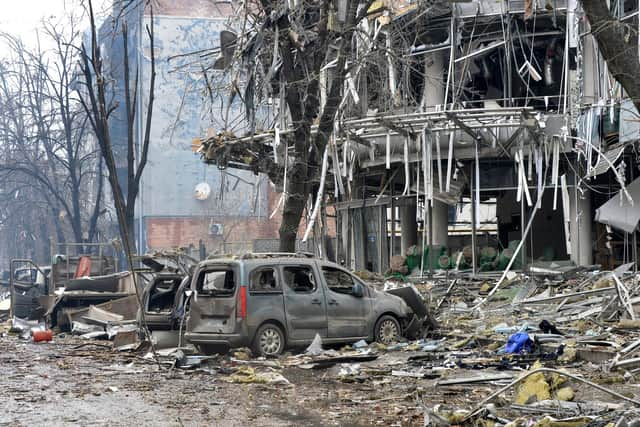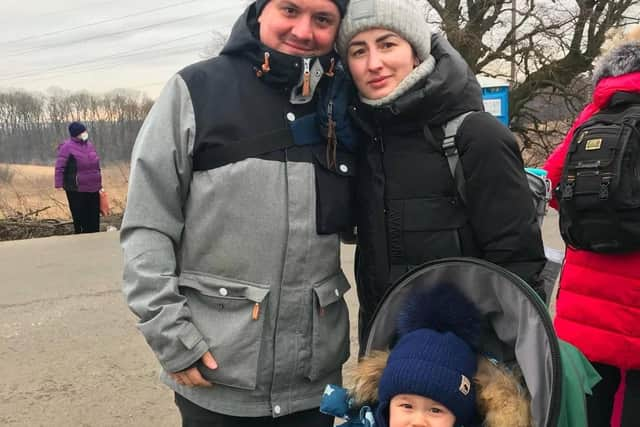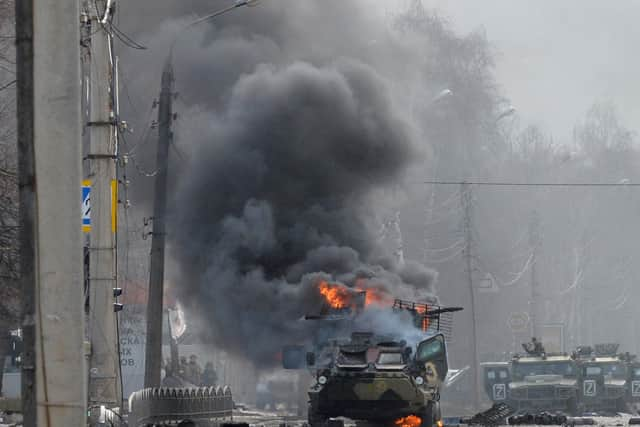Ukraine-Russia war: Bombing of homes, schools and hospitals in my country has changed the way I think about violence – Alex Sedov
We weren’t really expecting war – like, really, will someone start a war in 2022?
But we have a small kid and so, just in case, we made a plan B: to evacuate from our home in Kharkiv, near Ukraine’s eastern border with Russia, towards Lviv in the west by car and then see what happens.
Advertisement
Hide AdAdvertisement
Hide AdWe woke up at 5am with the first blasts, waited until my father-in-law came over from Chuhuiv, and then headed through central Ukraine, because the road through Kyiv was gridlocked within the first hours.
We then spent two days driving and it was an apocalyptic experience – gas queues, military convoys, horrible car crashes, and a night bombing that came close while we were driving past Uman.
At that point, the media reported that Russian forces had broken through in the south and I forced my father-in-law to drive further west, because we were literally between the advancing forces and the route towards Kyiv.
Finally, after 23 hours of driving, we stopped close to Vinnytsia and slept in the car on the motorway. I basically blacked out with my 13-month-old son sleeping in my arms. Travelling on, it took us one more day to reach Lviv, with all the traffic and roadblocks. We stayed at a friend's house and started thinking about what to do next.


The border crossings were also a nightmare with day-long queues and trains full of people fighting one another, so it took a few more days to get our in-laws, women and our son to safety in Germany.
We found a remote border crossing with small queues in Poland and my wife and son crossed on March 2 and I remained in Ukraine. (see editor’s note below)
We somehow managed to help a friend’s family to make the journey, then another one to get across. Finally we became a small volunteer group that helps refugees to get to the border, avoiding the long, horrible queues in the cold weather. Money was a problem at first, but we opened a charity and got lots of support from Ukrainians and my friends from all across the globe.
Now we have six cars and we are constantly helping women and children to get out of Ukraine.
Advertisement
Hide AdAdvertisement
Hide Ad

As for our home city, after the Russian forces failed to subdue Kharkiv, they started to level it with artillery and bomb it to hell. First they attacked military targets, but now they are just randomly shooting rockets at residential areas.
We help refugees from Kharkiv every day and the people travelling from there are mentally crushed, broken.
One family lived for ten days in a basement with broken sewer pipes pouring down on them.
For eight hours, two girls repeatedly tried to board the evacuation trains, running from the subway shelter to the train station and back to the shelter, while the whole neighbourhood was being shelled by artillery.


When they finally boarded the train, they rode for three hours in total darkness until the train reached a safe zone.
Even after getting on these evacuation trains people had to ride for 20 to 30 hours without food or even a place to sit, unable to sleep. Some said that horror movies are now like Disney cartoons compared to what they had to endure.
As for me, I remember that some years ago, I talked to a friend who fled Donetsk in 2014, when it was taken over by pro-Russian rebels.
He said that, at the age of 40, he was left with nothing. I have a similar feeling now with all my business projects – I happen to be a beer sommelier and pub owner – most likely to go under even after we win this war.
Advertisement
Hide AdAdvertisement
Hide AdBut I’m 100 per cent sure that we will win and we will build a new life and a new country. I’m also 100 per cent sure that we will never forgive how the Russians bombed our homes, our schools and even a f***ing maternity hospital.
I used to be against violence and I never supported the idea that Ukraine could only live in peace if all Russians were killed. But now I find myself feeling good when I see the videos of dead Russian soldiers, ripped apart by bombs or burned to a crisp.
I also agree less and less with arguments against pointing captured Russian artillery at the nearest Russian cities – like Voronezh or Kursk – and giving their population a taste of their own “special operation”, as they call the Russian invasion of Ukraine.
I don’t know what is worse – that my mind is filled with such dark thoughts or the fact that my son’s first walk outside on his own feet happened in Berlin, and without me.
This article has been edited to remove a line added during the production process that Alex Sedov had crossed the border into Poland. The Scotsman apologises for the error
A message from the Editor:
Thank you for reading this article. We're more reliant on your support than ever as the shift in consumer habits brought about by coronavirus impacts our advertisers.
If you haven't already, please consider supporting our trusted, fact-checked journalism by taking out a digital subscription.
Comments
Want to join the conversation? Please or to comment on this article.
